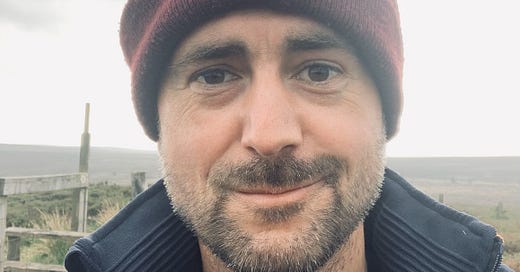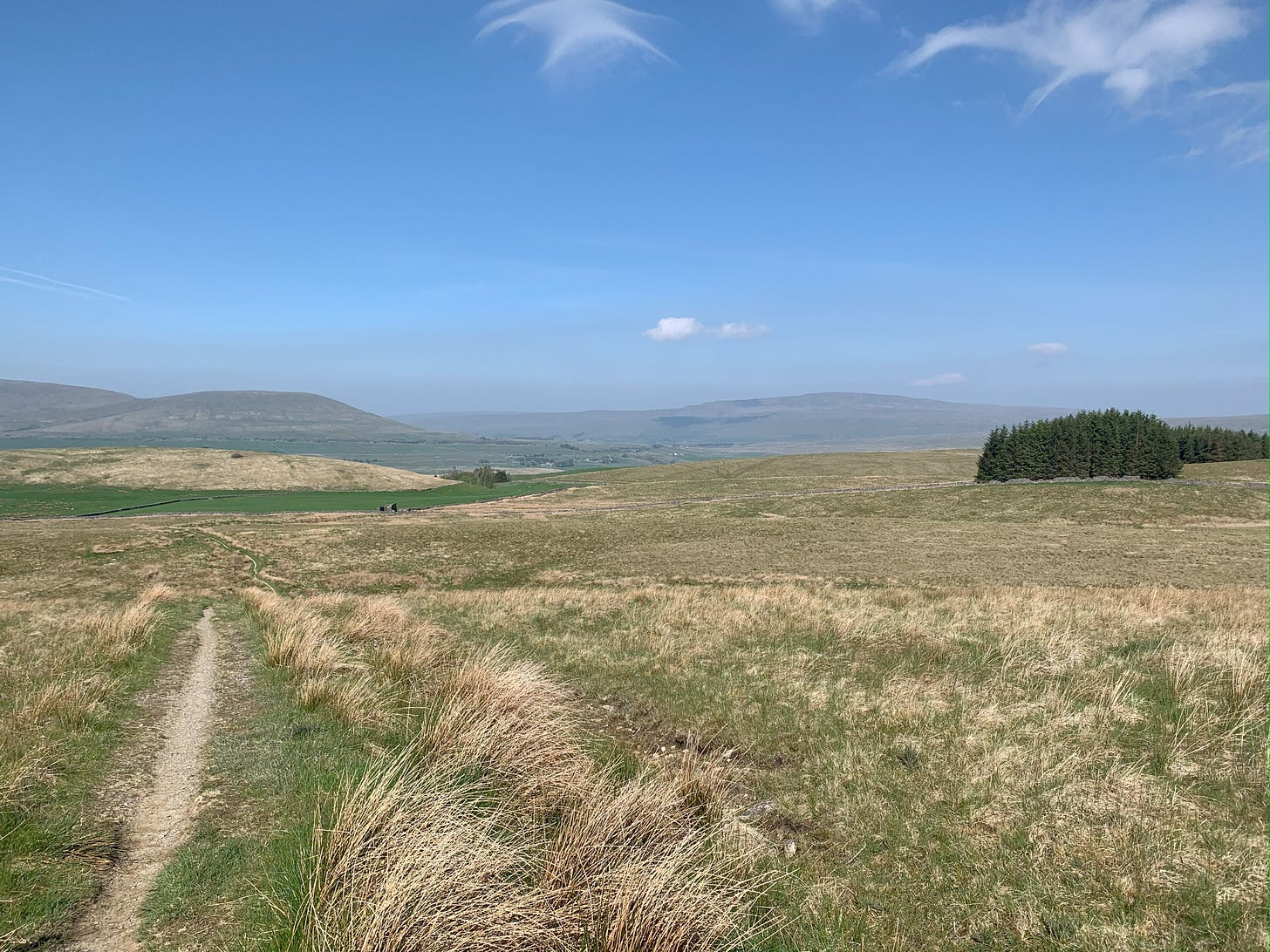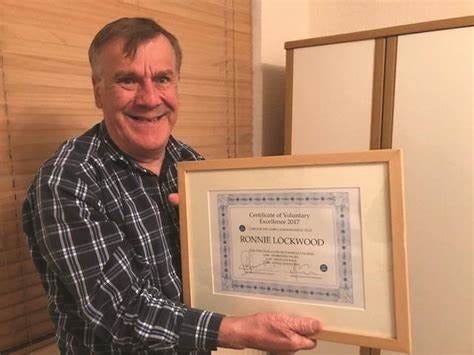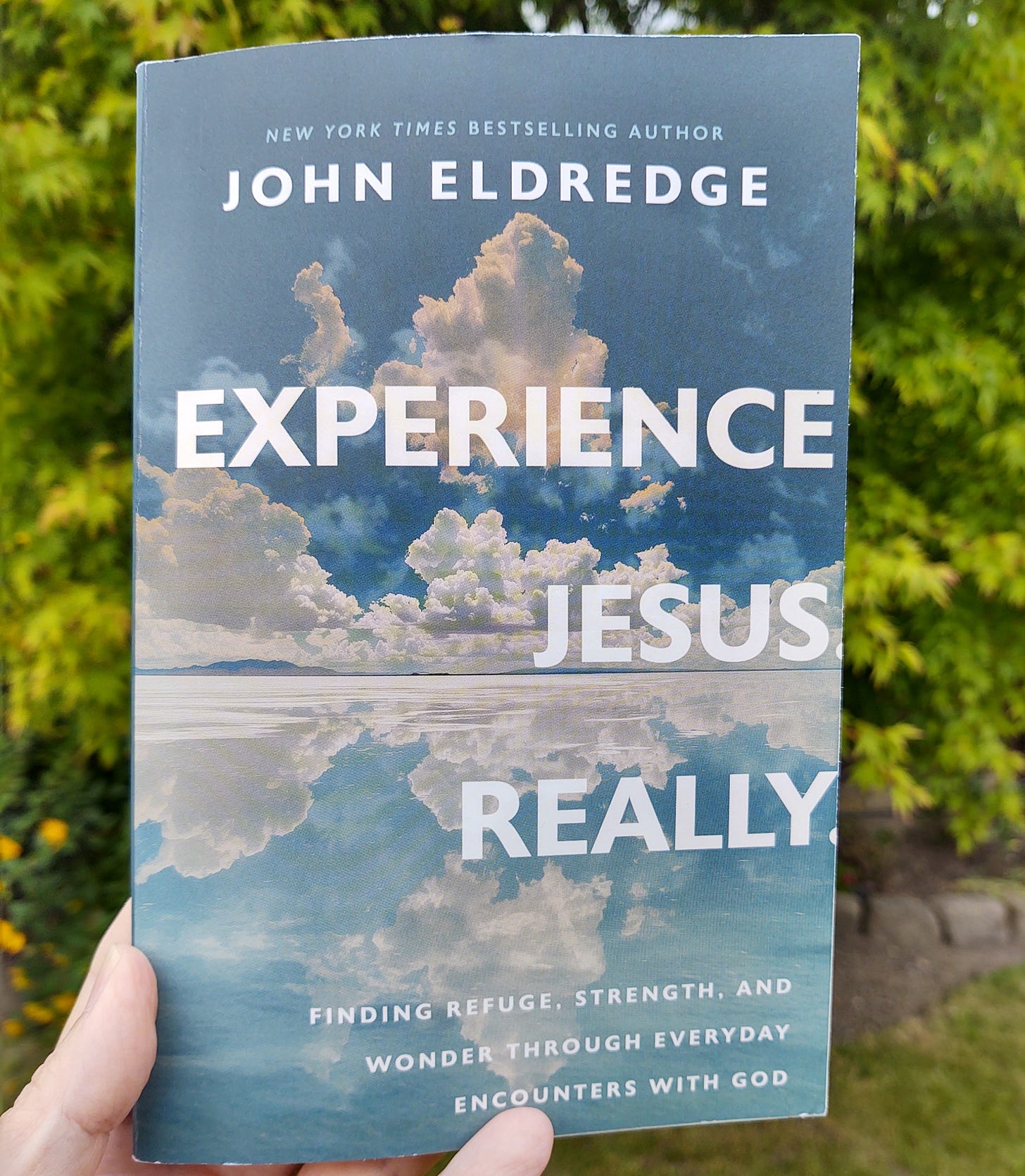Hiking and hallucinations
By Andy Kind
The sun’s heat finished its brekkie, downed a couple of Pro Plus and came out to play, and by 9am it was absolutely sweltering. The sky was fairytale blue, cloudless and regal, but as I plodded on a growing sense of dread started to overhang me. I was drinking plenty of water and making striding progress, but the minimal sleep (four hours), meagre breakfast and intense early-morning exercise was sending my body into the early stages of survival mode. Already, necessary nutrients were falling back from my extremities to reinforce the inner keep.
At the peak of Fountains Fell (668 metres), having skirted deserted mineshafts and leapt over sinkholes, I saw the valley suck the high ground away in an almost tidal ebb. And there in front of me, cresting its own monstrous wave, was the peak of Pen-y-Ghent.
As a one-off climb it looked doable, but I’d already walked 10 miles, was feeling isolated, lonely and paranoid. I couldn’t remember feeling this tired this early.
I stood at the foot of Pen-y-Ghent with the same sort of vertigo you get on the clacking ascent of a rollercoaster or the obtuse climb of an aircraft. Despite the increasing heat I had started to shiver, and I sat down at the side of the path feeling completely discombobulated. I frantically messaged Phil, to ask what was happening to me: “Sounds like you need fuel pronto. Get yourself some nuts or an energy bar asap. And keep drinking water.”
Then, for the first time in my life, I started to hallucinate. Not one of those cool hallucinations where an ancestor you never met appears to you and offers benevolent guidance. Not a prophetic vision to be interpreted using Scripture and brought before the King. First, a tree uprooted itself and started walking along the valley floor swinging its branches. Then a sheep grew to the size of a horse and started galloping towards me. I don’t know what happened subsequently because at that point I simply blacked out and collapsed. I can’t have been out for very long, but the whole experience was terrifying. Today was supposed to be about setting new personal bests - but ‘first hallucination’ and ‘most dramatic swoon’ weren’t on the bucket list.
What saved me was the swell of bank-holiday picnics peppering the Yorkshire Dales. Having spent ten minutes desperately trying to compose and re-orient myself and taking on as much water as I could, I staggered over to a motorhome parked under the shadow of the mountain and sought succour. The hallucinations had ceased by this point, but my dignity was a beach at low tide, an ebb without a flow. A Spanish mother, a Scottish dad and a brace of Spottish children gawped at me like the post-apocalyptic vagrant that I had obviously become.
“We don’t have any energy bars” the mum said “but we got lots of nuts, ooh, and a couple of bananas.”
“That would be phenomenal, gracias” I said, using literally the full extent of my Spanish.
“Sorry we cannae drive ya back tee Scotland, but yall be OK in a wee while” the dad said.
“Thanks, mi hearty” I replied, not really knowing any Scottish lingo and so hoping pirate talk would get me close enough.
My energy levels gradually stabilised and my metabolism came out of its coma. Nevertheless, the ensuing fifteen minutes climbing to the 2280-foot pinnacle of Pen-y-Ghent were the longest and hardest of any walk I’ve ever done, as I panted and creaked my way to the summit. To make matters worse, fresh-as-a-fruit-corner fell runners were out for their weekend sortie. Halfway to the top, an unfeasibly nimble satyr of a man leapt past me, all glistening triceps and heroic nipples. He was followed shortly after by a lady who can’t have been far off ‘oldest woman in the world’ territory, but she made me look stupid as she triple-jumped her way heavenwards.
“Morning!” she called.
Bog off, I said under my breath, then sat down on England’s most uncomfortable rock for a rest.
My pack was hefty rather than heavy, but you feel every single ounce of that when climbing - and you really are climbing. My front satchel was helping to distribute the weight around my body, but it was destabilising up this cliff and I was teetering like a Weeble. I needed to lose weight from somewhere, and three lockdowns had ensured it wasn’t going to be from my waistline.
Finally, finally, I reached the top of Pen-y-Ghent. The views from the top were expansive and high-definition, but I was really too overwhelmed to appreciate them. Rambling clubs and ultra runners and abusive parents who want their child to be the next Bear Grylls, all of them were milling around, snapping selfies and opening hot flasks. I found a spot away from the mad in-crowd, unstrapped my rucksack and front satchel (I would empty the latter and hurl it into a gulley before the descent) and lowered myself to the ground with the care of a pallbearer. I stayed there for half an hour, hardly moving, regretting everything I’d ever done. My face felt like one of Dali’s melting clocks, my eyes seemed to want to relocate into my nostrils, while my tongue appeared not to be there at all. A concerned man in a running vest wandered over to see if I was OK, but I just didn’t answer him, I couldn’t remember how to.
Andy Kind is a writer and comedian. Since 2005 he has travelled the world making people laugh. This story is an extract from The Wayfarer (pictured above), his seventh, and favourite, book. Order The Wayfarer here and the ebook here.
God’s odd people
By Jeff Lucas
Like a pesky mosquito flying an endless sortie around my head, a nagging thought that just wouldn’t be swatted buzzed around my brain last Sunday. I looked around the congregation that I was with, and wondered. Why were so many of people so downright odd?
This approach is unusual for me. Most of the time I scan the backs of the heads of my fellow worshippers and feel inferior. They, I reason, are surely far more godly than I. While I struggled to read a single proverb this morning, they have surely imbibed great chunks of the book of Numbers – and memorized them to boot. While I am fog bound in the Chicago airport of spirituality, and peer hopefully, and occasionally hopelessly through the mire, they have a digital wide screen, super sharp, billion pixel vision of Jesus and an ISDN always connected/super speed download capacity for prayer.

But this morning, I wondered: what a strange lot my fellow Christians are. That chap over there who wears sandals – and, worse still, socks with them – year round, even through the snowy months. That enthusiastic brother at the front who insists on dancing in the worship even though it is to the unmeaty sound of an acoustic guitar and even through slow songs like He is Lord; is he keen, or just not well? That lady with a hat that is in fact a straw fruit bowl stuck on her head, wearing it as she does in the belief that Jesus wants her to and the sun should be eclipsed anyway; she’s very much here, but is she all there?
It’s an uncharitable notion, and I feel waves of guilt as I confess it, but why are so many of God’s crowd just so weird? It got worse. I wondered: is church just a stained glass holding pen for a whole herd of the weakest links? Are we theologizing what is really just a social need for losers to hang together? Would they still come if we sang songs of worship to goldfish?
Before you rush a letter to the editor (who, by the way, is a Christian but does not hold her specs together with sticking plaster a la Jack Duckworth), let me say that I have repented of my uncharitable musings. I still am nervous when I meet Christians who were blatantly committed to being boring souls before they met Jesus, and in all the years that they have been around Him, the most exciting personality in the Universe, they have maintained that commitment to dullness. But I have realised that I was very wrong in my judgment.

First of all, the kingdom of God is for losers. Never mind the superficial surface evidences, like so called fashion or style, of what it means to be a sad type. We are all of us invited to join God’s party on the basis of our admitting that we didn’t make the grade, not that we breasted the tape with pride. Thank God, His banquet is not a garden party for the successful and the smooth. The broken down, need to get out more, came in last types are offered a seat of honour at the king’s table. Far from being an Ascot races enclosure for the loaded, fashionably beautiful top dogs, the kingdom offers a free pass paid for with blood for those who would normally be left shuffling around outside, or invited only in order to use a broom to sweep up the winner’s mess.
And then, who is to say what is a loser anyway? Church is not the arena of the cool types, who strive to get cooler in Jesus’ name. The superficial badges of appearance and competence that we have to wear to fit must be left at the door. Those who are called nerds out in the icy world are welcome, but once inside, around the Father’s warm hearth, the word “nerd” is banned now. All are invited here, whether you look like me or if you are mistaken for Richard Gere. In this kingdom of under achievers, only the style police are banned, and even they can come in if they will just put down their truncheons.

The lonely, those who bumble nervously and incoherently at parties, and don’t often get invited again because of it, are home here. And I can fit right in, and not because I have now decided to wear all season sandals. It’s because of the knowledge that we’re all messed up, all have sinned, and the call to us all is to come into Dad’s house, where the table lamp of welcome still burns in an upper window.
God is the champion who chooses the awkward, gangly limbed players for his soccer team, and gives them equal honour to the Beckhams. He is the swashbuckling romantic who kisses the plain Janes, and insists on utilizing ordinary people for His purposes and blessing them in the process. One reason for his heart for the ordinary is simple; ultimately, we all are.
Ordinary. But much loved.

And, before you go, take another look at the chap with the socks and sandals combo, and you’ll catch a glint of gold. He’s fought a year - long bout with cancer, and lost his wife a decade ago. He trudged his way through a lot of heartache and pain, but he’s still worshipping from the top of his head to the soles of his sandaled feet. Looks like a real winner to me.
Jeff Lucas is an international author, speaker and broadcaster. He is the bestselling author of 34 books, broadcasts a weekly radio show with Premier Radio and is a monthly contributor for the UK magazine Christianity. Jeff writes daily bible reading notes Life with Lucas in printed and digital format. Connect with Jeff here: jefflucas.org, also Facebook https://www.facebook.com/Jefflucasuk
A knock at the door
By Rob Parsons
There was a knock at the door. It was two days before Christmas, early evening and already dark. My wife Dianne and I had been married for four years. If I had known how much it would change our lives, perhaps I wouldn’t have answered it. But I did. A man stood in the darkness. In his right hand he held a black plastic bag, that I later discovered contained all his worldly possessions, and in his left hand a small parcel. I wasn’t filled with the spirit of Christmas as I said in a tone that matched the frostiness in the air: “Can I help you?”
He smiled as if he felt sorry for me: “Don’t you recognise me? It’s Ronnie Lockwood.” And with that he thrust the small bundle he was clutching in his left hand towards me. I took it from him. It was cold. I peeled back part of the paper and peered inside: a frozen chicken.
How could I have forgotten him? When I was a child, my parents didn’t go to church, but they sent me to Sunday School in a little chapel on the corner of our street. One day, Miss Williams, our teacher, said that the following week a new boy would be joining us. He didn’t have a family as we all did, and lived in what she called a care home. She warned us of horrors worse than the fires of hell if we were mean to him.
When he was 11, Ronnie suddenly disappeared. It was only when I was researching A Knock at the Door and read his care records that I discovered why. He had some educational challenges and the local authority had decided it would be a good idea to send him over 200 miles away to a school for ‘subnormal boys’. I once asked him the name of childhood school. He didn’t hesitate in his reply: “It’s called ‘The Backward School’.” At age 16, the authorities sent him back to Cardiff, but with no real support, he became homeless. I would sometimes see him in the city centre, or if he dropped into the youth group that Diane and I ran at the church.
I shook my head, embarrassed I had not recognised him at first. “Of course I remember you, Ronnie. Where did you get your chicken?” He said: “Somebody gave it to me for Christmas.” I smiled, “Come in Ronnie. I’m sure Dianne will cook it for you.”
To her credit, Dianne welcomed both Ronnie and the chicken, but as we were finishing eating she gestured for me to follow her into another room.
She said: “What are we going to do?”
I replied: “What do you mean?”
She said: “He’s homeless, we can’t let him sleep rough over Christmas.”
And so, I went back into the kitchen and asked Ronnie if he would like to stay with us that night. He looked up at me and smiled as he spoke: “Fine.”
He never left.
He lived with us for over 45 years until his death three years ago, aged 75. He was with us before we had kids and still part of our home long after those children had flown the nest and had kids of their own.
A Knock at the Door tells the story of that almost half a century of Ronnie being part of our family.
Rob Parsons is an author, speaker and founder. He has written more than 25 books that have sold over a million copies in multiple languages including The Sunday Times business bestseller The Heart of Success, The Money Secret and The Sixty Minute Series on relationships. The story above is an extract from his latest book A Knock at the Door. Connect with Rob here.
The Viking in Your Pocket
By Dave Hopwood

Jim Kardach had finished work for the day. He sighed and picked up his paperback. Flicked to the page he was on. But in his head there remained a crucial question. What on earth could he call this new bit of technology? This groundbreaking tool which would mean phones could talk to computers. The question rattled around his mind as he attempted to settle his eyes on the page. And then he saw it. And it hit him. The name of a Viking king. Harald 1st. Otherwise known as . . . Harald Bluetooth. I've no idea if that's exactly how it happened. But what we do know is that back in 1996, the man who invented Bluetooth got the name from reading a historical novel about Vikings. (See The Etymologicon by Mark Forsyth.) That technology in your back pocket really is named after a Danish king.
Harald left a legacy and has no idea about it.
My guess is that when Peter, Paul, and John sat down to scribble their letters to this new and fast spreading community, they had no idea I'd be commenting on them now. Back then they had no Christian Bible, just the Hebrew Scriptures, or Old Testament as we call it. It was most likely beyond their wildest imagining that a bloke in the UK (where?) would read their words in English (in what?) 2000 years later (how long?!).
We never know what God will take from our lives and magnify in a way only he can. We may say and do things and immediately forget them, but God has a way of spreading good stuff. A few years ago I started printing little encouragement cards to offer to others when I go out speaking. Little cards for spreading an uplift to another person. Then one day I got an email from a church in France, and a version of the little card in French. Someone had taken one of the cards to France and the church there had taken it on themselves to do their own. Nothing to do with me. God just took a seed I had sown and magnified it. You and I may never be great and famous. But that will never stop God from taking the good things we say and do and passing them on to others in a way we could never imagine.
‘No eye has seen, no ear has heard, no mind conceived of the things God has prepared for those who love him.’ It says this in 1 Corinthians 2 v 9. God has a much bigger plan and vastly greater imagination than we do. So keep on doing the good things, though it may not be easy, and let God take care of the rest.
Dave Hopwood is a writer and speaker who loves communicating the Bible using contemporary media, humour and stories. He is author of a series of books retelling the Bible including The Shed, The Bloke's Bible, and Raging Grace. He speaks at various places and regularly publishes ideas and material via his website: www.davehopwood.com
Unless you become as little children
By John Eldredge

When our boys were young, they would gather blankets, pillows, and cushions in the basement and build elaborate forts. This was their most-played game, a weekly if not daily affair. Once constructed and made secure, blankets tucked into sofas, cushions piled up as barriers, they would take refuge inside. Sometimes to read by flashlight or share candy treasures, other times for imaginary games. But mostly just to tuck in and “be”, to enjoy the experience itself.
You probably built forts as a child. A refrigerator box was an absolute gold mine of a discovery, for with a few windows cut out and some duct tape on the doors it was an instant fortress.
The building of forts is a universal childhood practice that researchers have become intrigued by. Carol Stock Kranowitz, author The-Out-of-Sync-Child, explains: “Forts help children reset their stressed bodies and brains. The darkness inside a fort eliminates the stimulus they do not need and intensifies what they do need . . . physical comfort and solitude . . . safety and control. We seek out comfort. We need to restore order.”
Simply put, it’s a way of making their world smaller for a while. And children are mystics by nature. They don’t need to understand global weather patterns to find the evening snowfall utterly enchanting. They don’t need to know the brain science behind their parents’ love for them; they simply feel safe being loved. And yes – those forts aren’t actually fortresses; they collapse rather easily. But the little mystic within experiences a level of comfort and assurance that I think most adults are famished for.
Everyone needs a place to feel safe.
Everyone needs somewhere to go to tuck in, where the world can feel small again or at least shut out for the time being.
It might be good to pause and reflect: What is your current safe place in the world? Where do you go for refuge – not only physically but emotionally, psychologically, spiritually?
This story is a short extract from John Eldredge's new book Experience Jesus Really (pictured above). John is an author, counsellor, teacher and the president of Wild at Heart, a ministry devoted to helping people discover the heart of God, recover their own hearts in God’s love and learn to live in God’s Kingdom.
Closing thoughts: This month I’ve had an exciting time reaching out to some of the most creative, contemporary communicators of our time. I honestly didn’t expect any of them to get back to me and might have inadvertently squealed a little bit when the positive responses arrived!
I hope you’ve enjoyed reading the July issue of Sorted Digital and can find the time to chill with a good book from one of these gifted writers.
God bless
Val Fraser, Editor


















Thank you…
Spectacular! Thank you.